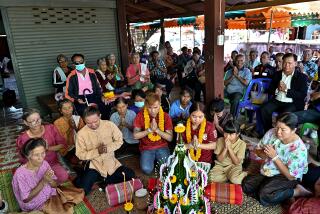‘They want to erase us.’ California Uighurs fear for family members in China
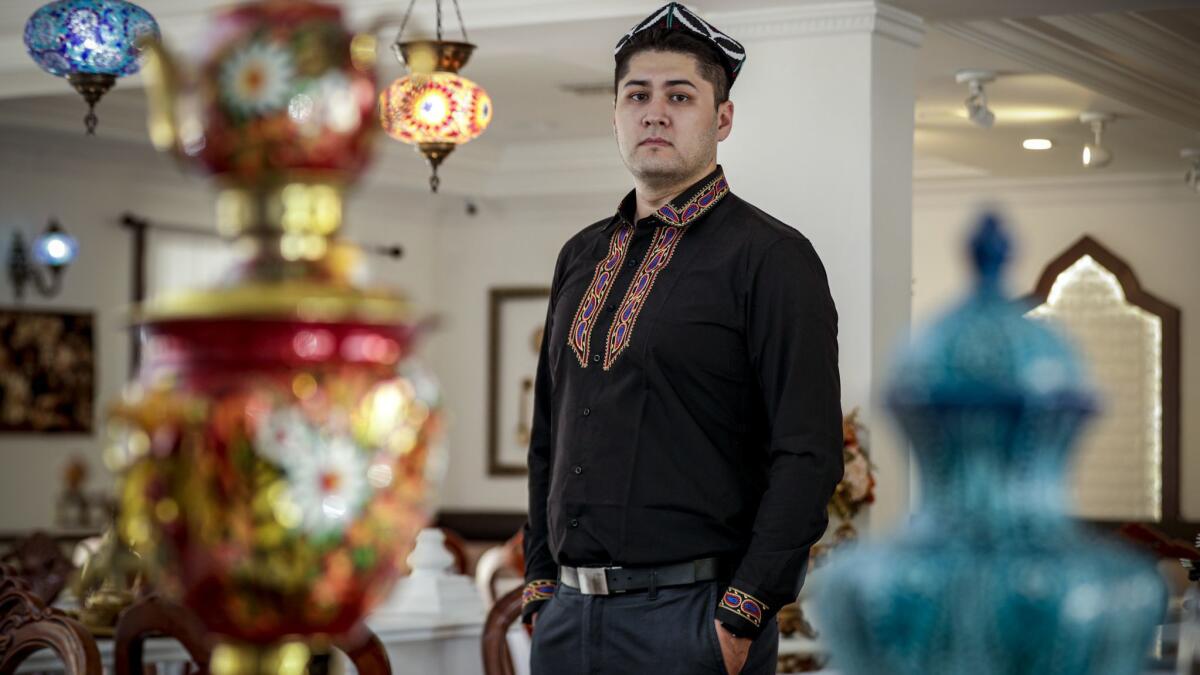
Eyes cast toward the tile floor of his Uighur restaurant in Alhambra, Bughra Arkin sighed and rubbed his temples. His thoughts shifted to his family in Xinjiang, China, to the father he knew had been arrested by authorities and possibly placed in a “reeducation” camp nearly 7,000 miles away.
Arkin knew something was wrong late last year. The two usually spoke every day, but the calls and messages had stopped. Days went by with no contact with his dad. Then a month.
“I was devastated. I was totally frustrated. I didn’t know what to do,” said the 28-year-old, who hasn’t spoken with his father in nearly nine months.
He is among a growing number of Uighurs in the United States who have had family members detained by authorities in northwest China, swept up in a large-scale social engineering campaign aimed at replacing the Uighur identity with a secular Chinese one. Decades of clashes between the region’s Turkic, predominantly Muslim people and the ruling Communist party have sparked a series of violent uprisings that the Chinese government has responded to with a crackdown and the creation of a surveillance state.
A United Nations committee estimated last year that about 1 million Muslims — mostly ethnic Uighurs but also other minorities — in the autonomous Xinjiang territory were being “held incommunicado” without “being charged or tried, under the pretext of countering terrorism and religious extremism.”
Chinese officials say the measures taken are needed for national security. In the Xinjiang region, home to about 10 million Uighurs, thousands of violent incidents — which authorities call “terrorist attacks’’ — have occurred since the early 1990s. Last month, Chinese officials claimed without offering evidence that a majority of the detained Muslims had been released from internment camps and “returned to society,” an assertion met with deep skepticism outside the People’s Republic.
In Southern California, home to about 1,000 members of the diaspora, Uighurs say there is not one among them who has not had a friend or family member “disappeared” by Chinese police. Like Arkin, they are left to worry whether — and where — their loved ones have been taken and whether they will surface again.
Arkin moved to California in 2015 to study international public policy and management at USC before opening Dolan’s Uyghur Cuisine, the eatery he has filled with touches of his homeland: popular Uighur prints, spherical lamps patterned with blue and orange starbursts, and a television playing videos of folk dancers.
He had planned on going back to Xinjiang after graduating, he said, but tensions there kept him from reuniting with his family. He still speaks with his mother about once a month, texting on WeChat. They self-censor, steering around sensitive topics like the camps and focusing instead on small talk.
“We can’t get more information because there is no room to speak,” Arkin said. “They monitor everything.”
Experts say Turkic minorities are being subjected to intense political indoctrination, forced confessions and intimidation. In countries such as Turkey and the U.S., many Uighurs are afraid that speaking out could have ramifications both for them and their families in Xinjiang.
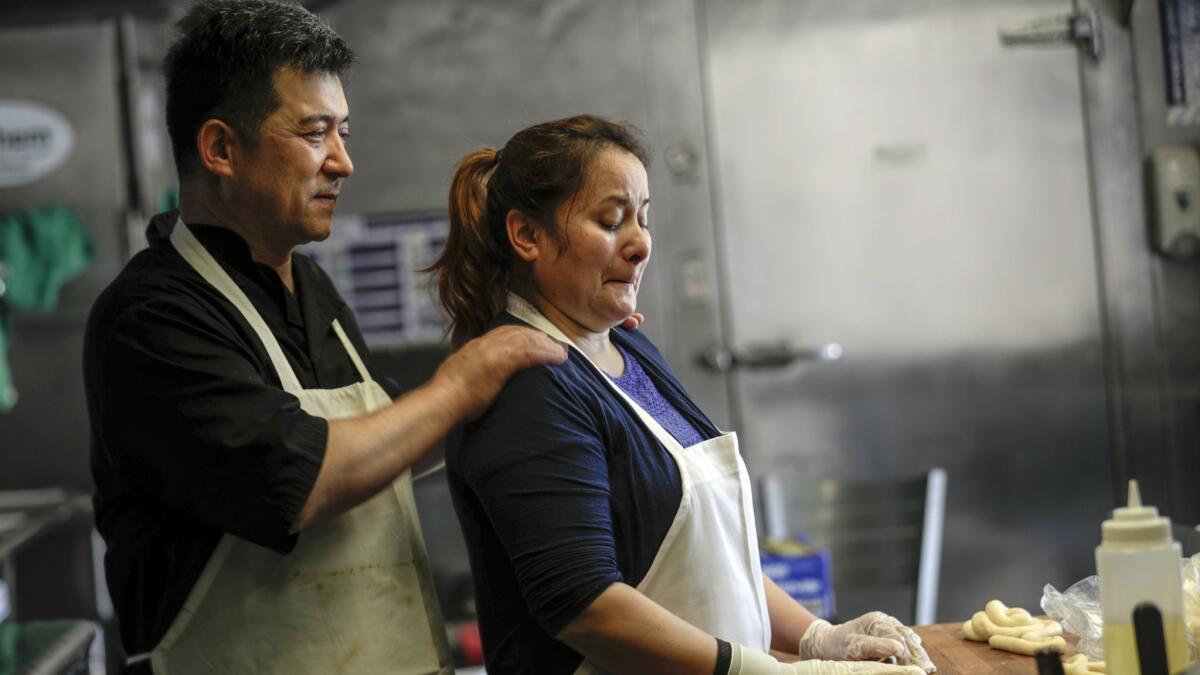
Arkin has tried to spread awareness about the persecution of Uighurs, penning a petition to the United Nations to ask for help getting his father released. He had planned on posting his story on social media, but his mother warned him not to.
Before his disappearance, his father was a book editor who ran his own publishing company in Xinjiang’s capital, Urumqi. There, they published textbooks and had a contract with the government for such materials, Arkin said. Nearly all of the business’ 14 employees also are also unaccounted for. Most had masters degrees, he said.
Arkin doesn’t believe China’s explanation that the camps serve to improve Uighurs’ language skills and offer vocational training.
“He doesn’t need reeducation,” Arkin said. “This is how China is fooling the world. This is about our culture, our identity. They want to erase us.”
Many of Arkin’s customers have heard of the repression there, he said, but find it hard to believe. They often ask him to explain what’s happening and whether he has any proof of the conflict. He shares his father’s story.
Though small, the Uighur diaspora is spread throughout California, with communities in the San Gabriel Valley, Santa Clarita, Orange County, San Diego and San Francisco.
Arkin’s two cooks at Dolan’s Uyghur Cuisine also are Uighurs: Parida and her husband, also named Arkin, who moved to California in 2016, and asked that their full names not be used for fear of reprisals by the Chinese government. The couple, who live in Diamond Bar with their two sons, are seeking asylum. Neither has spoken with their siblings or parents in Xinjiang in nearly three years, they said.
The last time they made contact, Arkin’s sister told him that his former restaurant and home in Urumqi had been locked up by police. Authorities also had asked the sister for Arkin’s phone number in the United States, which she said she provided.
She asked him not to call again. It wasn’t safe.
The eldest of four children, Arkin worries for his 86-year-old parents’ health and security. Arkin and Parida celebrated their fourth Ramadan away from their family earlier this year. Both felt powerless and wracked with guilt over their inability to protect their relatives. If it weren’t for the detention camps, they said, they would go back home.
“Whenever I hear the word ‘parent,’ I feel bad and I want to cry,” he said.
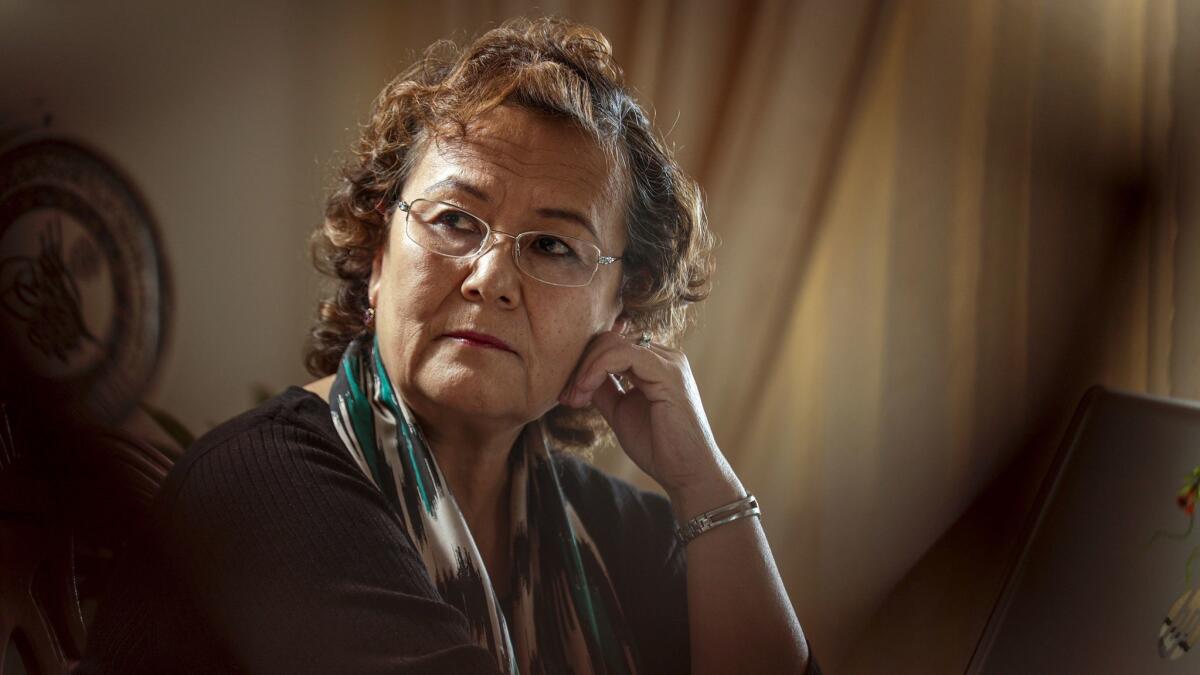
Gulbahar Mamut, a Northridge resident who has lived in the U.S. for more than 30 years, noticed the growing tensions in Xinjiang when she visited family in the region in 2015. She spotted checkpoints everywhere — at department stores, on the street — and noticed the increased security Uighurs face at airports. Only Uighurs were stopped, she said, and forced to open their bags. Some were detained.
“It just terrifies me. I went there and I felt like I was in a war zone,” Mamut, 61, said.
Even at that time, people “sensed that something was going to happen,” she said. When she tried to discuss the checkpoints with friends and family, they would turn off the lights and cut off the electricity in their homes in case the government was listening, whispering so that the neighbors couldn’t hear.
The detention camps and lack of communication with her family cast her into a deep depression, she said. She stopped working and dedicated her time to a local Uighur group that focuses on rallying the community and garnering support for the Uyghur Human Rights Policy Act that is making its way through Congress.
Mamut said she hasn’t talked to her relatives back home since early 2017. Her husband has sporadic, limited contact with his family, but information on Xinjiang is scant. He learned of his mother’s death through a surreptitious video he received on WeChat that was promptly deleted after he watched it, Mamut said.
“I have no idea if my brothers and sisters are safe or if they are alive,” she said. “I can’t sleep well at night because I’m constantly worrying about them and their children.”
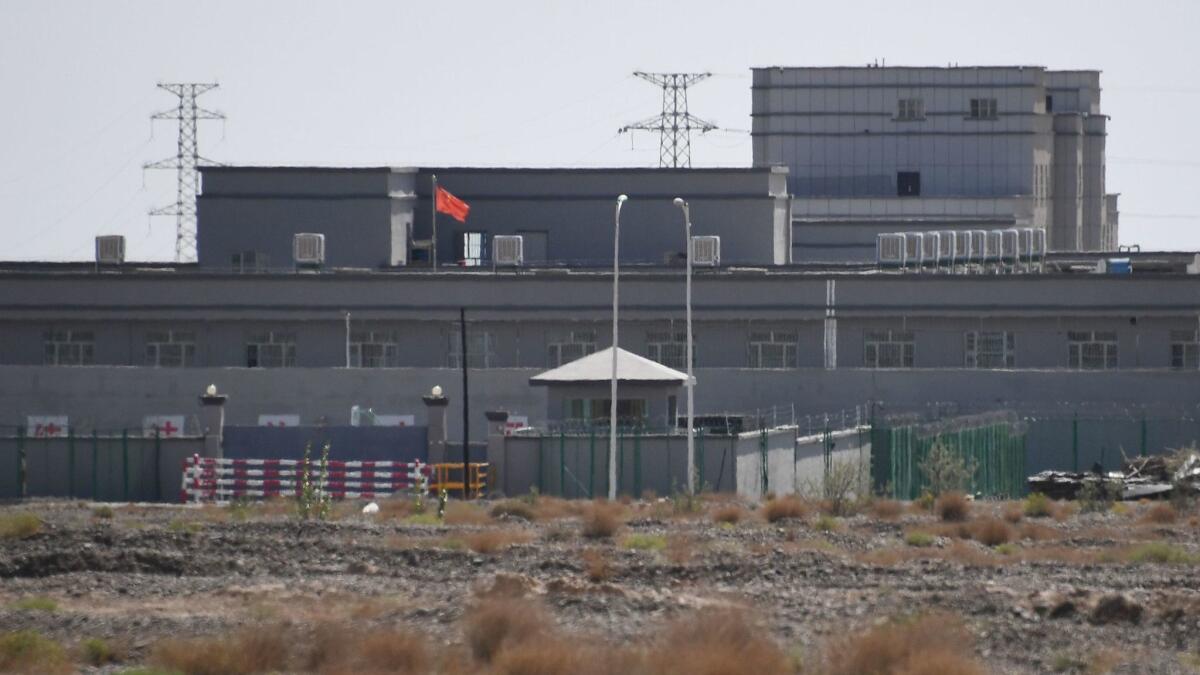
On a recent Thursday in Santa Clarita, a group of Uighurs gathered around a backyard table and swapped stories of their families and memories of their motherland.
As they picked at bowls of nuts and pastries, one woman explained that two of her uncles and two of four cousins in detention had just been released. One cousin came home with poor eyesight because of how he was treated in the camp, she said.
“We don’t know what to do,” said the woman, who along with the rest of the group spoke on the condition of anonymity.
She is grateful that her parents were able to move to California in 2016, she said, glancing across the table at her father, who was neatly arranging a stack of pictures of family and friends who were lost to the camps or disappeared.
“He would be the one in a camp,” she said of her father.

During the Cultural Revolution, her father said, all Chinese experienced the same political turmoil — Han and ethnic minority alike. But he felt the vise grip tightening in recent years, a gradual pressure campaign built over time that has left 200 people he knows unaccounted for.
“It’s as if there’s a herd of sheep attacked by a wolf and I am the only one left, shivering and living in fear,” he said with a faraway look.
The 70-year-old leaned forward in his chair and looked at the men smiling and standing by his side in photos. Although he is safe in America, he no longer feels like the man he used to be. He has started taking anti-depressants to help him sleep, he said.
“I don’t have anything to look forward to,” he said.
His son-in-law nodded.
“For most of us, it’s been depression over the last two years. Before, we used to dance, sing, joke around,” he said.
He stepped inside and retrieved the dutar hanging on his wall, silently handing the two-stringed lute to his father-in-law.
The elder’s fingers wrapped around the instrument’s long neck and he closed his eyes, his brows furrowed as he played a lament.
More to Read
Sign up for Essential California
The most important California stories and recommendations in your inbox every morning.
You may occasionally receive promotional content from the Los Angeles Times.


